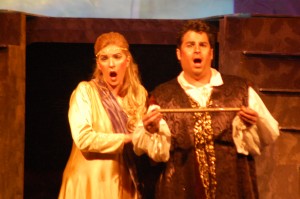 The Connecticut Lyric Opera (CLO) kicked off its eighth season with four performances of Mozart’s Die Zauberflöte. I attended the third performance of the run on November 20 at the Waterbury Palace Theater. The production was sung in German with dialogue and supertitles in English. Once again, CLO presented high quality opera that was sophisticated, both musically and dramatically.
The Connecticut Lyric Opera (CLO) kicked off its eighth season with four performances of Mozart’s Die Zauberflöte. I attended the third performance of the run on November 20 at the Waterbury Palace Theater. The production was sung in German with dialogue and supertitles in English. Once again, CLO presented high quality opera that was sophisticated, both musically and dramatically.
Despite the company’s small size, the cast was excellent. The character of Tamino, the bewildered prince in search of love, was portrayed by tenor Michael Wade Lee. Describing Mr. Lee as superb would not be overstating his talent. His voice was clear and powerful and easily filled the entire theater. Mr. Lee’s portrayal was believable and his acting was never over the top. He clearly is very talented and has the potential to sing in the world’s great opera houses.
Jurate Svedaite, a CLO regular, sang the role of Pamina, the abducted princess. As always, Ms. Svedaite sang with beautiful tone and smooth, lyric phrases. Her entire performance was quite convincing and her aria “Ach,ich fühl’s” was especially moving.
The bird-catcher Papageno was brought to life by Matthew Gamble, another regular of the company. Although Mr. Gamble tended towards overacting, his light baritone was well suited for the role and he performed with natural charisma. Elizabeth Kinder excelled in the small role of Papagena with her youthful timbre and spirited presence. Laurentiu Rotaru portrayed the role of Sarastro, a noble chief priest. Mr. Rotaru sang with a full, round voice, and his acting was always dignified.
The sinister Queen of the Night was portrayed by CLO debutant Liane Grasso. Ms. Grasso, although having a smaller voice, sang with the accuracy and agility essential to the Queen’s difficult music. Her coloratura was superb, and I look forward to seeing her perform again. Daniel Juarez sang the role of the deformed Monostatos. Although Mr. Juarez’s singing was not very polished, he was convincing as the evil slave driver.
Eden Casteel, Jennifer Marshal, and Brooke Larimer were the mysterious ladies-in-waiting to the Queen of the Night. All three women possess big voices and worked well together to convey the eeriness of their characters. The three spirits, portrayed by Adrianne Bitting, Laura Koroski, and Harrison Gatch had light voices and seem to blend together effortlessly. Gregory Sheppard, Alexis Benson, Fred Goff, and Hartley Horn, who portrayed other members of the priesthood, enhanced the evening with their strong performances.
The CLO chorus was a powerful presence onstage and the entire cast was supported by the Connecticut Virtuosi Orchestra under the baton of Maestro Adrian Sylveen. The orchestra, although small, brought new life to the score. Because of its diminutive size, one could hear individual parts stand out, but the musicians were able to blend their instruments into a cohesive sound, giving the sore a chamber-like quality.
The CLO presentation of Die Zauberflöte was clever and inventive. Although the company has limited resources, it was able to present a high-quality production that was captivating to the children in the audience while still keeping the adults’ attention. The set was simple – two staircases joined by a platform on top. To evoke different areas in Sarastro’s temple, the production made use of image and video projections which were effective in evoking a varied range of locations. Also, the English dialogue between arias and the slight rearrangement of scenes in the second act allowed for a more fluid and understandable storyline.
This performance was enjoyed by an audience of 300 – 350 people with a large number of children. I encourage you to attend a CLO performance – you won’t be disappointed. The company has one more presentation of the Die Zauberflöte on December 3 at The Garde in New London, along with three “New Year’s” concerts on Dec. 31 and Jan. 02 and 08, as well as a run of Tosca in the spring. This is a growing company bringing wonderful performances to Connecticut communities.